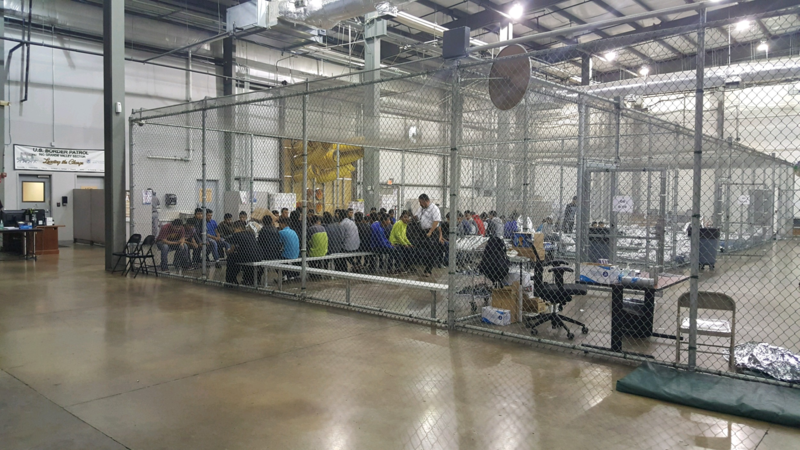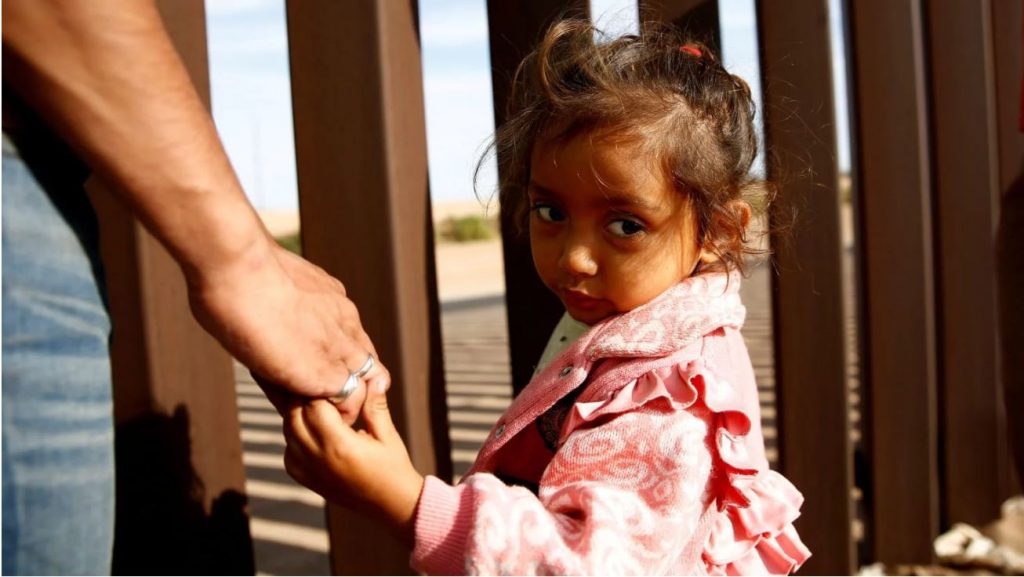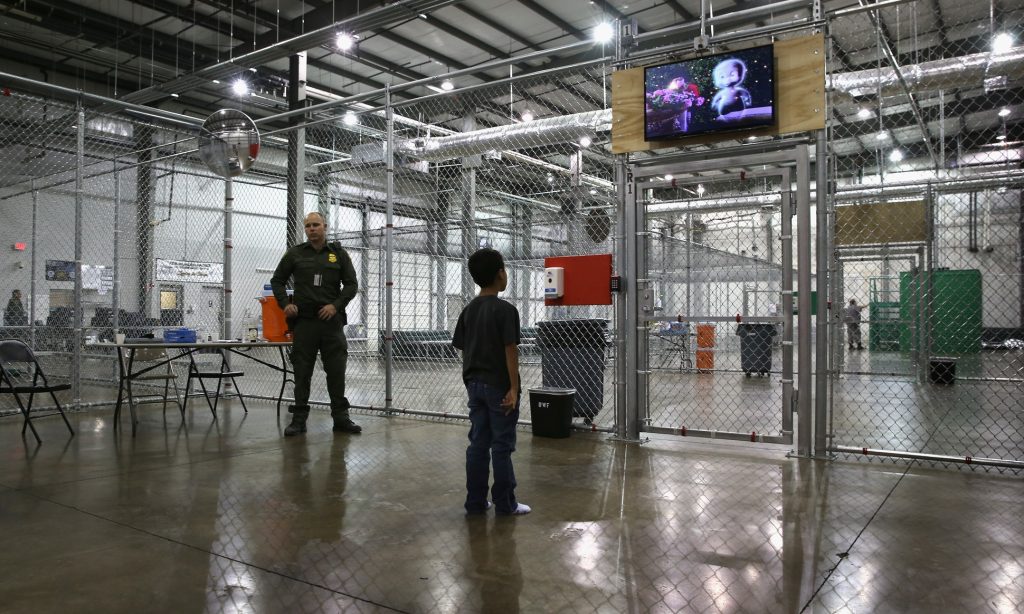
Below are the remarks from the Fall 2018 BPSI Bulletin with Frances Lang, LICSW, Member of BPSI and Karen Melikian, PhD, Member of BPSI, of their experience interviewing fear-stricken mothers who were separated from their children while trying to cross the border into the United States in August 2018.
In May 2018, the Trump administration began enforcing a “zero tolerance” policy whereby all those seeking asylum at the southwestern border of the United States would be referred for federal prosecution. An aspect of this deterrence strategy involved separating children from their parents, causing more than 2,300 children to be sent to detention facilities while their parents were sent to jail. Shortly after this, Dr. Gilbert Kliman, Director of the Children’s Psychological Health Center, put out an appeal to members of the Association for Child Psychoanalysis and the American Psychoanalytic Association for help conducting interviews at the border that might be used for evaluations on the asylum seekers’ behalf. Over 70 people responded.
On August 7, Dr. Kliman put out an urgent call: evaluators were needed at the South Texas Family Residential Center (a detention center) in Dilley, Texas, to interview 17 women slated for deportation and write evaluations, with a deadline of August 14. These were women who had been separated from their children, then reunited with them.
When being interviewed by U.S. Immigration and Customs Enforcement (ICE), an asylum seeker is required to prove to the satisfaction of the authorities that their fear of returning to their home country is credible. To the great misfortune of these 17 women, their “credible fear” interviews had taken place while they were separated from their children. All 17 had fled their home countries out of fear of being tortured and/or killed. Yet at the time of their interviews, they were desperate with anxiety over the whereabouts and well-being of their children and could not focus on the events that caused them to flee. Thus, they received what is called a negative finding.

Our task was to evaluate the mental states of the women at the time of their credible-fear interviews and, if indicated, to add our evaluations to their attorneys’ legal requests that they receive new hearings. By law, people who are suffering from a mental illness at the time of their ICE interview must be provided with appropriate accommodations. Our expectation was that these women had been traumatized and overwhelmed by the loss of their children and the government’s refusal to provide them with any information.
The two of us, Dr. Kliman, and three other clinicians arrived at the Dilley detention center on August 11. Despite our submission of all the required documents, for a time it was unclear whether we would be allowed to enter. Eventually, we were told to leave our cell phones in our cars and were put through metal detectors. Once in, we entered a large, relatively comfortable room equipped with a few tables and chairs. Notably, many of the staff in the detention facility—really the “good cops,” the soft face of ICE—tend to be Spanish speaking, guarding individuals more like themselves in many respects than we, the therapists.
We met with our clients in small interview rooms. Dr. Kliman was accompanied by his own translator. The rest of us depended on telephonic interpreters—all volunteers. Our reports needed to be honest and based on true clinical judgment. They become part of the legal case for the asylum seeker and are subject to cross-examination by the government’s attorneys. No matter your politics, telling the truth is the best way to help the case and to establish yourself as a credible evaluator. We began our journey with this in mind, as well as the directive to first do no harm. Once you are on the dusty roads of rural Texas, though, driving to prison buildings behind barbed wire in the middle of nowhere, you start to wonder how any law or human being could justify forcing families to live like this. Dilley does provide food and shelter to people who have made an arduous trip, fleeing violence and mounting hopelessness about the future. And yet, it’s an open question whether the detention process, including family separation and the cruelties experienced by women in some facilities, could come to feel as full of horror and suffering as life in their own countries was.

Each of the eight women we interviewed had been traumatized before leaving her home country and further traumatized by being separated from her child or children. One woman described how, upon their arrival in Texas, her seven-year-old son had been told to board a bus. She boarded with him, assuming that they would be traveling together to whatever unknown destination they were bound for. When she was told to get off the bus, she and her terrified son clung to each other. Weeping, they were torn apart, and she was forcibly removed from the bus. She reported that she would never forget that moment. Though mother and son were now reunited at the detention facility, he was not eating. The purpose of this interview was to evaluate what the woman’s mental status had been at the time of her credible-fear interview, back in June, but her son’s lack of appetite and lassitude were her chief concerns.
Another woman had been separated from her daughter for four months. Upon their being reunited, she learned that her daughter had been taken to another state and, while there, had undergone a potentially risky medical procedure, about which the mother had not been consulted. A third woman was accompanied to the interview by her 17-year-old daughter so that the teenager could speak on behalf of her mother, who was so depressed that it was difficult for her to respond fully to questions. Each mother remained realistically fearful that she might once again be separated from her children.
Over that August weekend, our interviewees, captives, came to meet us in a large room from wherever they lived in the detention facility—quarters that we never saw—and accompanied us into the smaller interview rooms to try to tell their stories. We tried to listen. They returned to prison. We wrote up our evaluations and submitted them to Dr. Kliman, who submitted them to the women’s attorneys. We do not know whether the attorneys were successful in applying for new credible-fear hearings or what the results of any such hearings have been or will be. Many families remain separated. Many more remain in detention. Detention threatens to expand. The demand for psychological evaluation on behalf of detainees will, similarly, increase rather than diminish.
Frances Lang, LICSW, is a social worker, and faculty member of the Boston Psychoanalytic Society & Institute (BPSI). She also teaches at the Massachusetts Institute for Psychoanalysis. She is on the staff of the Brookline Community Mental Health Center and she has a private practice in Brookline, MA.
Frances Lang can be contacted by email here.
Karen Melikian, PhD, is a psychologist, graduate, and faculty member of
the Boston Psychoanalytic Society & Institute (BPSI). She is on the staff of McLean Hospital’s Child and Adolescent Programs and she has a private practice in Brookline, MA.
Karen Melikian can be contacted by email here.
***
The opinions or views expressed on the Boston Psychoanalytic Society & Institute (“BPSI”) social media platforms, including, but not limited to, blogs, Facebook posts and Twitter posts, represent the thoughts of individual contributors and are not necessarily those of the Boston Psychoanalytic Society & Institute or any of its directors, officers, employees, staff, board of directors, or members. All posts on BPSI social media platforms are for informational purposes only and should not be regarded as professional advice.
BPSI does not control or guarantee the accuracy, relevance, timeliness or completeness of information contained in its contributors’ posts and/or blog entries, or found by following any linked websites. BPSI will not be liable for any damages from the display or use of information posted on its website or social media platforms. BPSI cannot and does not authorize the use of copyrighted materials contained in linked websites.

